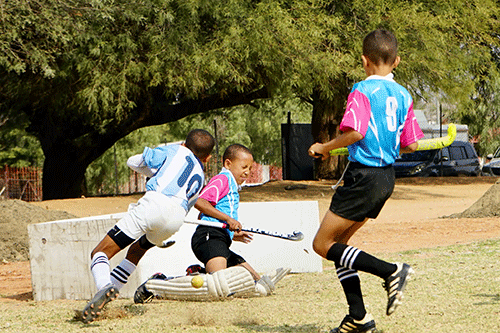The Hockey School of Excellence says over 1360 Namibian children (both girls and boys) under the age of 11 are currently playing the game in all 14 regions under the Standard Bank Junior Hockey Initiative that was launched in September 2021.
This was revealed by Erwin Handura, the project manager, to New Era Sport, where he said the programme is now available in 16 towns countrywide.
“Each town has four schools except Katima Mulilo (five), Windhoek (six), Ongwediva (five), and Gobabis (five). The number of schools is increasing as more schools want to join the project. Each town has its own competitive league, where the schools play against each other,” Handura said.
He added that the programme has seen 136 coaches being trained countrywide, mostly teachers, and 50 umpires.
Each school in the project is required to provide two teachers for the programme, while current and former hockey players are roped in to help as part of their investment back into the sport.
He added that this week, the Standard Bank Junior Hockey Initiative is hosting festivals where they choose the best 10 boys and the best 10 girls to represent their towns in a national tournament scheduled for the seventh of October.
“Yesterday, we hosted the first regional festival in Rehoboth, today we are in Mariental, and tomorrow is Keetmanshoop. We are going to Ombalantu, in Omusati on 14 September, while Ongwediva in Oshana region will be the following day, with Helao Nafidi in Ohangwena hosting theirs on 16 September,” he said.
The festivals will take place through the country until 29 September in Okahandja before the national festival which will see 16 boys and 16 girls selected for the national team to play against Zimbabwe and Zambia in August next year in Zimbabwe.
“The main aim was to introduce the sport throughout the country because previously, only four regions in the country participated. We want to make sure that there are many players coming through that will represent the country at all levels,” Handura explained.
Since the inception of the project, Standard Bank Namibia has provided N$1.5 million over three years.
The money is used to buy equipment, run the 16 regional leagues, incentives for the project team and host the various tournaments.
The Namibia National Schools Sports Union, the Namibia Hockey Union, and municipalities are part of the stakeholders.
The Namibian Hockey Masters under the leadership of coach Randy Slabbert, also donated equipment to the project as part of their giving back to the sport.
“The children are also taught sportsmanship, as they are required to shake hands after every match regardless of the outcome. They also taught basic life skills that come in handy in their day-to-day lives,” Handura explained.
The children are also taught about the safety of the game, the rules and regulations, and the basic and advanced skills of the sport.


